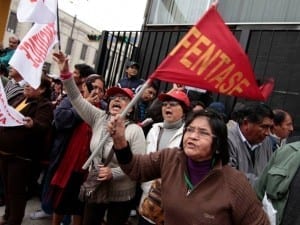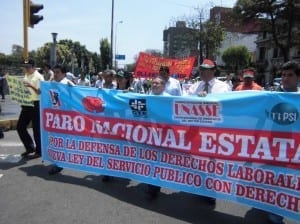
Public employees in Peru rally against a civil service law that takes away collective bargaining rights (above and below). Photos: Marcela Arellano Villa
Seeking to reach a collective bargaining agreement with the Peruvian government, three public-sector union confederations presented a joint petition to government officials in recent days. The bargaining proposal includes the freedom for workers to form unions, and stresses that worker rights should not be negated even though civil service is a “vocation and calling.”
Peruvian unions took inspiration from their brothers and sisters in Colombia, Argentina and Uruguay, who have negotiated similar industry-wide collective bargaining agreements.
The industry-wide bargaining proposal “is an opportunity to advance respect for freedom of association and collective bargaining in the public sector, which are currently under threat,” said Jorge Villa Garcia, deputy secretary general of the National Federation of Administrative Workers in the Education Sector (FENTASE). “It’s a chance for us to negotiate fair wages and establish agreements that will prevent conflict and help us build a better Peruvian civil service.” Villa Garcia is also Public Services International (PSI) coordinator for Peru
 Last July, the government passed a new civil service law that eliminated the right of more than 500,000 public administration workers to collectively negotiate salaries, narrowed the definition of the type of unions they may establish and prevents “essential service” unions from striking (without defining essential services).
Last July, the government passed a new civil service law that eliminated the right of more than 500,000 public administration workers to collectively negotiate salaries, narrowed the definition of the type of unions they may establish and prevents “essential service” unions from striking (without defining essential services).
The International Labor Organization (ILO) has criticized the new law for its unfair restrictions on collective bargaining and the right to strike. Some members of the Peruvian Congress and human rights organizations have noted that portions of the law are contrary to international labor legislation and say it provides no mechanisms to promote the provision of quality public services. Three separate lawsuits charge the civil service law violates the constitution, and members of the Peruvian Congress have sponsored five bills to modify it.
Peru’s new civil service law is part of a “second generation” of neoliberal state reform that includes the country’s privatization of its health, education and other public services, actions that entail the elimination of many public-sector jobs, according to PSI. Public-sector worker rights are under attack in Latin America and elsewhere around the world, even as rising inequality and lack of jobs, especially for young workers, further limit the ability of working people to support themselves and their families.
The Solidarity Center actively assists public-sector workers in defending their rights across the Andean region, including in Peru, Ecuador and Colombia, and in coordination with PSI, the global union federation that represents public-sector workers worldwide.
